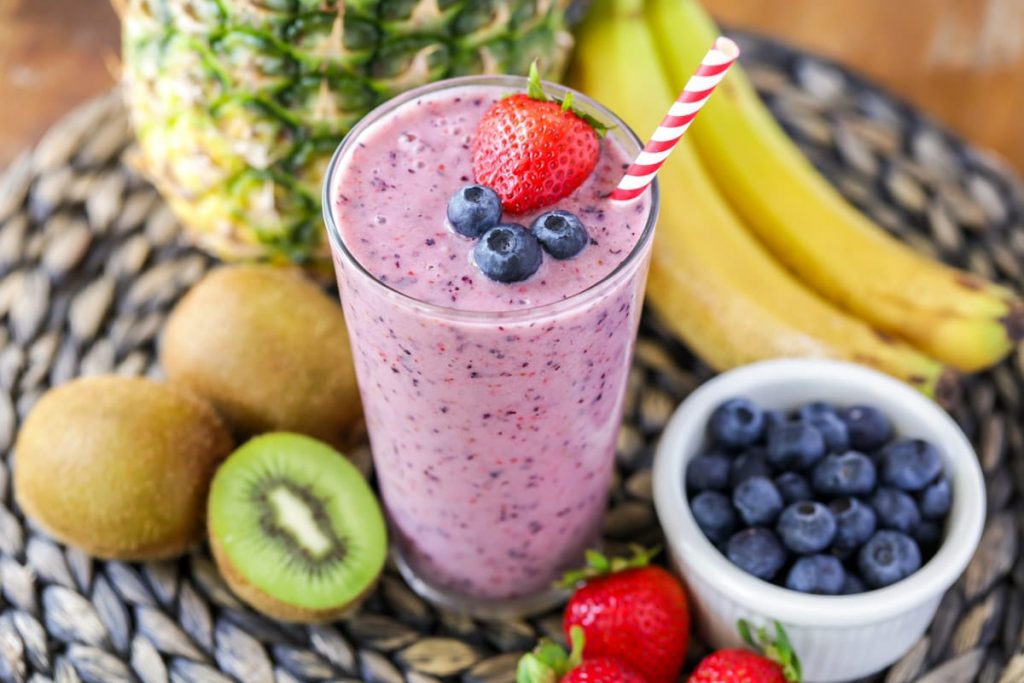Smoothies are viscous, creamy drinks, usually made from blending a variety of fruits and vegetables mixed with juices, yoghurts, nuts, seeds, non-dairy milk, and other choice ingredients. Some people consume smoothies as part of breakfast in the morning or as an afternoon snack. Aside from the fact that smoothies are extra delicious, they are packed with vitamins and minerals that are essential to our health. According to the World Health Organization (WHO), adults should consume at least five servings (400 grams) of fruits and vegetables daily. Not a lot of people enjoy eating just fruits, you can switch things up a bit by enjoying a glass of smoothie while still meeting the WHO’s recommended daily fruit intake. Also, smoothies are a great way to incorporate fruits to your diet.
Here are some benefits of smoothies according to health experts:
- Enhances Immunity The body’s ability to wade off infections and fight diseases depends on the strength of the immune system. Due to various factors, the immune system can be Smoothies include a variety of fruits and vegetables that can boost the immune system. Most especially fruits that contain betacarotene. “Vitamin C and beta-carotene helps to strengthen your immune system and synthesizes collagen that aids in the framework of your body,” says Laura Michele, a registered dietitian in Brooklyn, New York. Making smoothies from citrus, berries, grapes, and melons can provide sufficient vitamin C and keep your immune system active.
- Improves digestion Constipation and bowel upset are widespread challenges people encounter. An appropriate amount of fibre intake helps improve bowel movement. According to the ‘Closing America’s Fiber Intake Gap’ article, although the public is aware of the advantages of fibre intake and some people think that they consume sufficient fibre; national consumption surveys suggest that only about 5% of the surveyed population meets recommendations, and inadequate intake has become a public concern. The good news is that, smoothies supply sufficient fibre that aids digestion and proper bowel functioning. “Drinking fruit smoothies can help you reach the recommended fibre intake, 25 grams for women and 38 grams for men,” says Laura. “One serving of fruit typically contains two to four grams of fibre, with blackberries, pears, and apples having the highest concentration of five to seven grams per serving.”
- Reduces the risk of heart disease The major cause of heart attacks is Low-density lipoprotein (bad cholesterol) which clogs blood vessels and prevents the free flow of blood to and from the heart. Healthy drinks such as smoothies contain ingredients like oats that are entirely fat-free. Regular exercise combined with adequate consumption of fruits and, vegetables can keep heart diseases at bay Furthermore, citrus containing fruits, such as grapefruit, oranges, tangerines, and lemons, contain a reasonable proportion of vitamin C, potassium and folate, which helps to keep the heart in perfect condition. “Potassium supports your heart function and helps maintain normal blood pressure, while folate promotes healthy cells,” says Laura. Hence, smoothies made from potassium rich fruits such as bananas is likely to look after the heart.
- Helps in weight control Smoothies could be used as a meal replacement when trying to lose or maintain a healthy weight. Skipping breakfast is a common habit for those trying to lose weight. However, the aim becomes defeated because they end up eating more meals later. To avoid this, having some smoothie for breakfast can keep you full for a long time, and hence, you won’t have to eat so much later on. A 2012 Nutrition Food Science Journal, published in the National Library of Medicine, noted that those who consumed beverages like smoothies didn’t feel hungry for a longer period of time compared to those who ate whole fruits.
- They are a great source of antioxidants From time to time, free radicals that cause damage to the cells are released into the body; however, if the body contains a sufficient number of antioxidants, these compounds help to inhibit this reaction. Smoothies made from blueberries, strawberries, blackberries, raspberries, cranberries, and grapes are excellent sources of antioxidants. They protect the cells of the body from damage by free radicals. “Berries and grapes contain particular antioxidants that decrease inflammation and phytonutrients that help fight disease,” Laura says. Smoothies may form part of a balanced diet. However, Nutritionist Kerry Torrens says, “Be sure to focus on lower sugar fruits, emphasizing fresh or frozen produce. Include one or more protein sources like yoghurt, kefir or milk, and healthy fats from nuts, seeds, or avocados.” In the NHS Eat Well Guide, it is suggested that “fruit juice and smoothies should be limited to no more than a combined total of 150ml a day.”





Comments are closed.